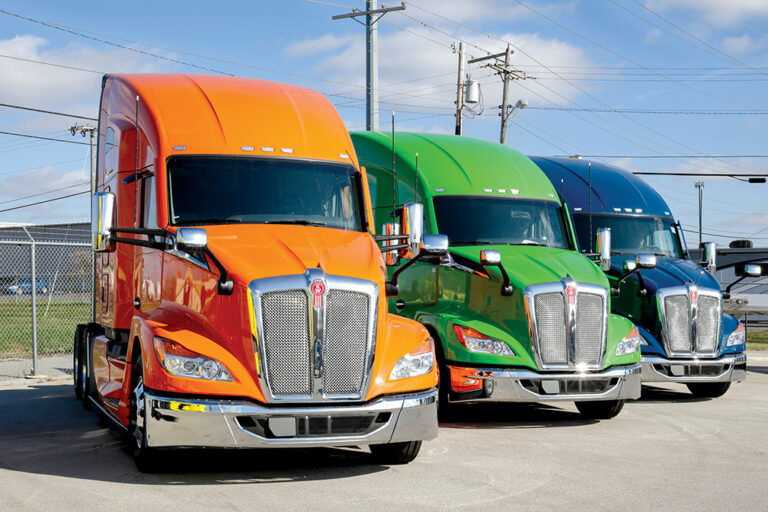LITTLE ROCK, Ark. — As expected, sales of new, Class 8 trucks on the U.S. market declined sharply in January, according to data received from Wards Intelligence.
January’s reported 18,594 trucks sold represented a decline of 20.5% from December’s 23,390 — a decline that happens every year. Carriers tend to buy more trucks at the end of each calendar quarter and especially at the end of the year.
Of more importance was the year-over-year comparison. January sales fell 6.7% from January 2023 numbers as carriers prepared for more months of near-bottom freight rates.
While actual sales fell, orders for new trucks went in the opposite direction.
According to industry analyst and forecaster ACT Research, 16,765 new Class 8 trucks were ordered in January, representing a whopping 44% increase over January 2023 order numbers.
“Given the state of for-hire truckload rates, we continue to suspect private fleets as the primary driver behind US tractor demand,” explained Kenny Vieth, president and senior analyst at ACT Research.
According to information received from FTR Intel, Class 8 orders for North America topped 26,400 units.
Orders for the past three months are equal to an annualized rate of 354,000 units.
“Fleets continue to be willing to order new equipment despite uncertainty in the freight market. Order levels were above the historical average and above seasonal trends, although we still expect 2024 activity to reflect replacement demand,” remarked Eric Starks, FTR’s chairman of the board.
On the used truck side, sales were surprisingly strong. The number of units reported sold in January was up 17% compared with December and up 34% compared with January 2023, according to a news release from ACT Research.
At the same time, the average price for a used tractor fell by 21% compared with January a year ago. Average miles dropped 12% and the average age 6%.
According to ACT Vice President Steve Tam, “The retail sales gain is uncharacteristic, as sales typically slow in the new year.” He continued, “Robust used truck demand suggests the opportunity for sales to improve moderately in February, as freight is showing nascent signs of growth.”
Another indicator of carrier confidence is the number of new trailers ordered each month. In January, indications are that they’re worried about over-investing in equipment for use in a stagnant market. According to ACT, 13,700 new trailers were ordered in January, down 43% from January 2023. In addition, order cancellations climbed to 3.2% as buyers backed out of deals.
Jennifer McNealy, director of commercial vehicle market research and publications at ACT, explained, “Healthy economic performance is increasingly favoring freight, but we are roughly balanced between the tail of an 18-month freight recession and the beginning of the next freight cycle.”
At the Feb. 21-22 Market Vitals conference hosted by ACT Research in Columbus, Indiana, Kenny Vieth repeated a common phrase: “When truckers are making money, they buy trucks.”
Citing information compiled from public carrier quarterly financial statements, Vieth explained that 2023 represented the worst financial performance for those carriers since the great recession of 2008-2009.
Vieth predicted that 2024 will see continue rough freight rates for at least the first half of the year, in part due to the excess of trucks available to haul freight.
More factors that could impact new Class 8 sales are government mandates for increased mileage and reduced emissions. California standards that go into effect in 2024 could start curtailing sales, and the new Environmental Protection Agency requirements that take effect for the 2027 model year loom large. Frequently, carriers engage in pre-buying, or buying more trucks in the years before new standards go into effect. Doing so reduces the risks of replacing trucks with untested and questionable technology, allowing maintenance and other issues time to get sorted out before investing.
Vieth’s message for truckers is that better days are coming with the beginning of a new freight cycle, but it will take longer than most would hope for. It won’t be until 2025 when growth in freight availability overtakes capacity and rates begin to rise significantly. He looks to 2026 for carriers to reach peak revenue levels before the downward cycle begins again.
As for sales at the individual OEMs, Freightliner was the only one to report a gain in sales for January. The company reported sales of 8,335 in the month, compared to 7,718 for December, a gain of 8.0%. Sibling Western Star sold 901 trucks, just 8 fewer than December for a decline of 0.9%.
The Volvo offerings declined the farthest month over month. Volvo’s 1,423 sold in January was down 1,055 from December sales of 2,478, a decline of 42.6%. Mack reported sales of 856 for January, down 986 or 53.5% from December’s 1,843 sold.
The PACCAR brands together declined about a third from December sales. Kenworth dropped from 4,105 in December by 39.4% to January’s 2,486 sold. Peterbilt fell 30.6% from December’s 3,881 to January’s 2,694.
International reported sales of 1,884 in January, down 22.9% from December sales of 2,442.
Market share is difficult to predict on one month of data, because delivery dates, production rates and other factors can easily influence the numbers. For example, Freightliner took 44.8% of new Class 8 trucks sold on the US market for January. That’s down from 47.2% in January 2023. However, Freightliner’s share of the market for the full year 2023 was 36.3%.
International was responsible for 10.1% of the January market but finished 2023 at 14.0%.
Factors that could impact truck sales for the remainder of 2024 include the upcoming presidential election, wars in Europe and the Middle East, the Panama Canal and weather occurrences. The Middle East conflict can threaten shipping in the Suez Canal and the Panama Canal, plagued by not enough water to operate locks, has slowed operation considerably. If shipping is impacted, or if conflicts result in fuel price increases, freight could be impacted and, in turn, truck sales.
Cost control and good load selection are still hallmarks of a successful 2024 for truckers.
Cliff Abbott is an experienced commercial vehicle driver and owner-operator who still holds a CDL in his home state of Alabama. In nearly 40 years in trucking, he’s been an instructor and trainer and has managed safety and recruiting operations for several carriers. Having never lost his love of the road, Cliff has written a book and hundreds of songs and has been writing for The Trucker for more than a decade.








